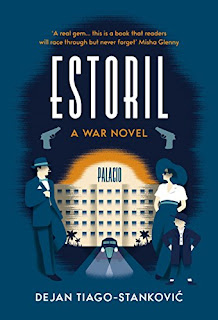Stephanie Jane reviewed Estoril by Dejan Tiago-Stankovic
Well researched WW2 espionage novel
3 stars
It's becoming a repeatedly bizarre coincidence, having previously hardly noticed any references, that since I read The Little Prince by Antoine de Saint-Exupery the book seems to be getting namechecked everywhere. In Estoril, Saint-Exupery himself makes an appearance and befriends a young Jewish refugee who may be the inspiration for the eponymous Little Prince. Tiago-Stankovic has certainly done his research for Estoril. The extensive cast of celebrity figures who found themselves benefiting from Portuguese neutrality during the Second World War are vividly brought to life here, together with spies and spymasters and the overworked local head of secret police for whom I frequently felt quite sorry.
Although obviously a work of fiction, Estoril is based in true events. What particularly interested me were the attitudes of many of the people who find themselves stranded in this Portuguese resort, especially in relation to the migrant crisis across Europe today. Mostly rich …
It's becoming a repeatedly bizarre coincidence, having previously hardly noticed any references, that since I read The Little Prince by Antoine de Saint-Exupery the book seems to be getting namechecked everywhere. In Estoril, Saint-Exupery himself makes an appearance and befriends a young Jewish refugee who may be the inspiration for the eponymous Little Prince. Tiago-Stankovic has certainly done his research for Estoril. The extensive cast of celebrity figures who found themselves benefiting from Portuguese neutrality during the Second World War are vividly brought to life here, together with spies and spymasters and the overworked local head of secret police for whom I frequently felt quite sorry.
Although obviously a work of fiction, Estoril is based in true events. What particularly interested me were the attitudes of many of the people who find themselves stranded in this Portuguese resort, especially in relation to the migrant crisis across Europe today. Mostly rich and well connected, several have lost their homes and anything they could not carry, yet they are not vilified as refugees in the West are today. Perhaps wealth or family history are their cushions or perhaps, with most of the continent seemingly on the move in one direction or another, expectations are different.
It took me a while to get used to Estoril not having a strong narrative thread that follows a single person. The storyline is set around the events of the war and we learn about these second-hand, the war itself being physically several hundred miles away even though the opposing nations all have active spies blatantly ignoring Portugal's neutral status. Chapters concentrate on different characters as they settle in or pass through so I thought Estoril often felt more like a collection of linked short stories than a novel. Tiago-Stankovic does well to impart as much background on these people as he can without resorting to lengthy information dumps, but I did find myself losing track of who was who, especially in the second half of the book. Estoril has a good sense of its time period, but I think I needed deeper portrayals of fewer characters in order to fully appreciate it.

